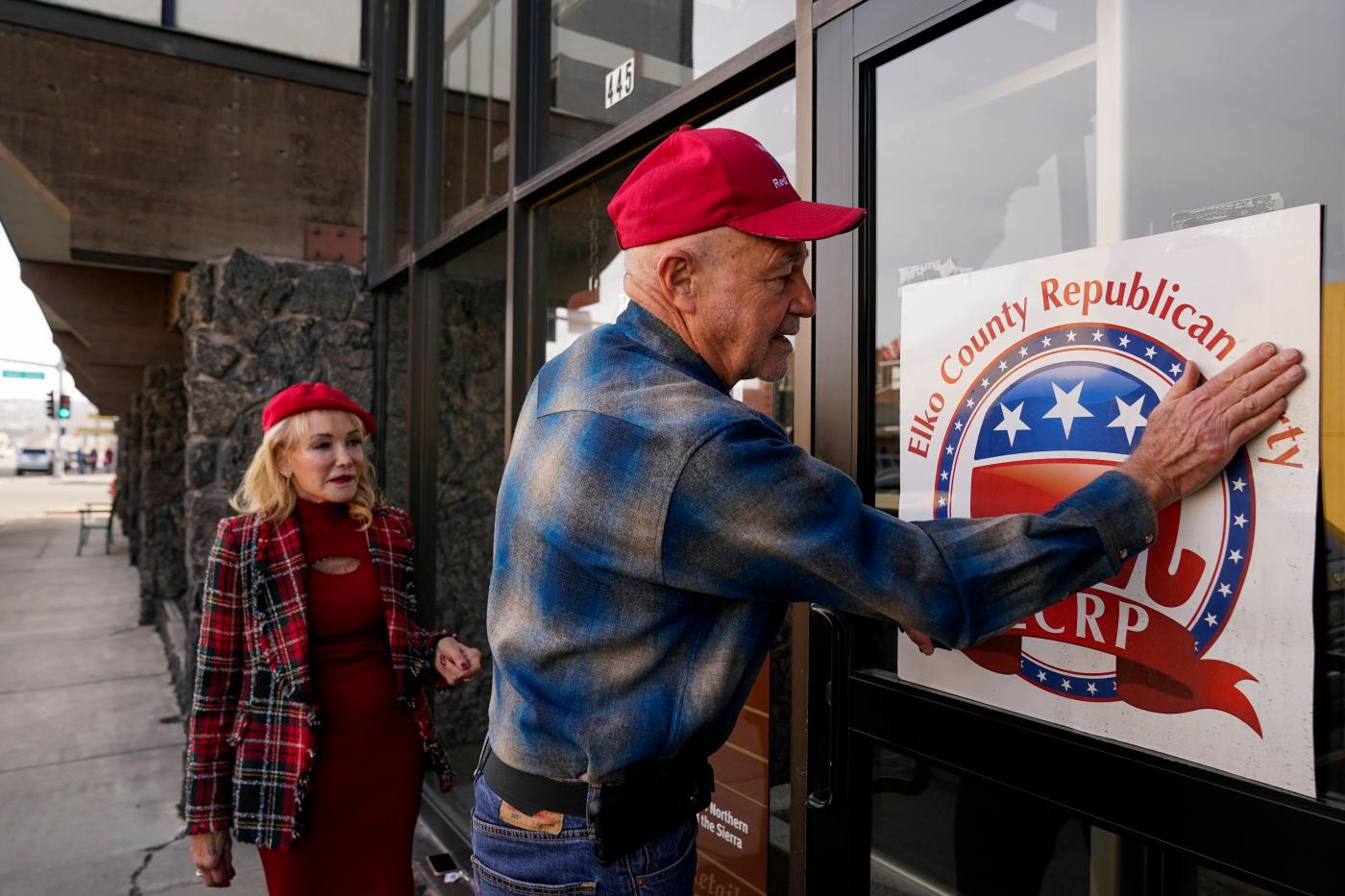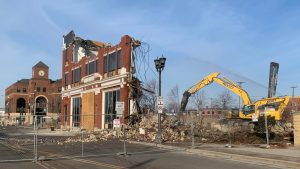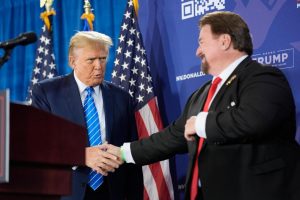
Most states have either caucuses or a primary. Why is Nevada holding both?
By GABE STERN and MICHELLE L. PRICE (Associated Press/Report for America)
RENO, Nev. (AP) — Lee Hoffman’s job is challenging in the best of circumstances.
In most presidential election years, the chairman of the Republican Party in Elko County, Nevada, is tasked with rounding up voters to help choose a presidential nominee at the GOP caucuses. It’s a complicated operation in a county of ranches and mining communities spread across an area larger than Massachusetts and Connecticut combined. His success sometimes hinges on how many people pick up the phone when he calls, or how many friends of friends he bumps into at the local supermarket.
This year, Hoffman’s work has been even more difficult. For the first time, he must help voters understand Nevada will have two contests over the course of three days — and only one that counts toward who is the GOP nominee.
That’s because a state law requires Nevada to hold a primary election, but the Nevada GOP voted to hold their own caucuses, or party-run meetings open to Republicans only. The party will only award delegates needed to win the nomination through the caucuses, rendering the state-run presidential primary purely symbolic.
Nevada voters have received mail ballots for the Feb. 6 primary that don’t list front-runner Donald Trump’s name. Why? Trump is competing in the party-run caucuses on Feb. 8, when he is poised to take all the state’s delegates on a march toward the nomination.
It’s Hoffman’s job to sort it all out for voters, including the people who call wanting to know why Trump isn’t on their ballot.
“It’s not an easy task, and I don’t have a panacea for it,” said Hoffman, 72, a former engineer for a mining company and city council member.
How is this peculiar arrangement even possible? Blame the Founding Fathers and the federal system of government they embraced in the Constitution. Outside of a few guiding principles, such as the Electoral College, the nation’s founding charter leaves the mechanics of running elections to the states. And there are 50 of them, plus the District of Columbia, each led over the years by lawmakers with their own ideas about how votes should be cast and counted.
Further complicating matters, it’s largely up to political parties to decide how their presidential nominee should be chosen. Some state parties choose to award delegates based on the results of government-run primaries, while others go for party-run caucuses. Then some, such as Nevada this year as well as Michigan, Missouri and a few others, end up with both.
Critics say the Nevada GOP’s new rules were designed to favor Trump and stack the deck against his rivals, most of whom have left the race as it turns to Nevada.
Related Articles
What to expect in Nevada’s presidential primary and caucuses
Haley pokes at Trump during ‘SNL’ appearance
Trump jumps ahead of Biden in new NBC poll, reveals VP shortlist
Can Trump be on the ballot? It’s the Supreme Court’s biggest election test since Bush v. Gore
President Joe Biden wins South Carolina’s Democratic primary as he gears up for his reelection bid
Of the major candidates still in the race, only former United Nations Ambassador Nikki Haley chose to run in the primary, though a win won’t give her delegates needed for the nomination. She has essentially ceded Nevada, instead looking ahead to South Carolina, where she served as governor.
“Talk to the people in Nevada: They will tell you the caucuses have been sealed up, bought and paid for,” Haley told reporters in New Hampshire, where she finished second to Trump in the Jan.23 primary. ”That’s the Trump train rolling through that. But we’re going to focus on the states that are fair.”
The state GOP, like others across the U.S., is led by Trump loyalists determined to take election processes into their own hands. Three Nevada GOP leaders overseeing the caucuses have been indicted on felony charges that they were so-called fake electors who sent certificates to Congress falsely claiming Trump won Nevada in 2020.
The rule changes also have caused rifts within the state party, with even the Republican governor worrying the dueling elections will confuse voters and decrease turnout. Others feared frustration with the process and bad publicity could hurt Nevada’s reputation as an early presidential nominating state. Nevada is the third state to vote in the GOP contest.
Will Bradley, a Nevada GOP central committee member, has been involved in state parties in Florida, North Carolina and South Carolina dating back to 2007. He opposed holding the caucuses but is now helping to organize them.
“(This is) the most confusing and significant debacle I’ve ever seen in Republican politics,” Bradley said.
PRIMARY OR CAUCUSES: WHAT’S THE DIFFERENCE?
States typically use either a primary or caucuses to vote for a presidential nominee.
Caucuses are party-run meetings that require voters to show up in-person at a set day and time, sometimes for hours. Turnout is typically much lower than in a primary, and leans heavily on party activists.
A primary is an election run by the government at the state and local level, where voters cast ballots on election day or in other ways permitted under local law, such as by mail-in ballot. It’s considered more inclusive than caucuses because it doesn’t require people to attend in person at a certain place and time — often for hours.
For years, Nevada held nominating caucuses. But the Democratic-controlled state government in 2021 approved a law that requires the state to hold a primary starting this year.
Nevada GOP leaders say they prefer party-run caucuses because they want rules in place, such as requiring voter ID and paper ballots, that Democrats wouldn’t approve for the state-run primary.
Republican Gov. Joe Lombardo, who took office after the law establishing the primary and its rules was signed, also tried to require voter ID for state elections. Though he was unsuccessful, he still has denounced the Nevada GOP’s plan to award delegates through caucuses, calling it “unacceptable” and saying it will disenfranchise voters.
Still, Nevada GOP Chairman Michael McDonald has forged ahead with the caucuses. McDonald was among the six Nevada Republicans indicted for falsely certifying Trump won the state in 2020.
He has introduced the former president at multiple events in the state this election cycle, including at a Las Vegas rally in late January. Each time, McDonald has urged supporters to make plans to attend their caucus to back Trump.
“You give us a fair election,” McDonald told voters at rallies in Reno and Las Vegas, “I’ll give you the next president of the United States — Donald J. Trump.”
HOW DO NEW RULES FAVOR TRUMP?
Trump himself told the crowd at the January rally to ignore the primary and attend the caucuses instead, saying “Your primary vote doesn’t mean anything.”
A Nevada GOP rule states that any candidate who participates in the state-run primary may not run in the caucuses.
But Republican voters may participate in both contests. In another twist, primary voters will have the option to choose “None of these candidates.” So it’s possible Haley will receive fewer votes than the “none of these” option.
Lombardo, a Trump supporter, said he planned to vote for “None of these” in the primary and then back Trump in the caucuses.
Trump and former Florida Gov. Ron DeSantis were among the major candidates who chose the caucuses. But DeSantis dropped out, leaving Trump without a major challenger for the caucuses – and Nevada’s delegates.
Even before many of his rivals left the race, the caucus format was widely seen as benefitting Trump, who has a solid grip on the GOP’s most loyal voters.
Trump and his political team have spent years building his grassroots support and cultivating relationships with party leaders, issuing endorsements in their leadership races and encouraging parties to adopt rules that benefit a well-organized, front-runner candidate like himself.
Ahead of the 2024 contest, Trump hosted state party officials at his homes, and his political aides nudged state parties — in Nevada and elsewhere — toward changes that tilted the nomination fight in Trump’s favor.
Trump allies leading the Michigan GOP, for example, adopted a new plan to award some delegates in a primary and others in closed-door caucus meetings four days later. California Republicans also made a last-minute rule change, pushed by Trump’s team, that says any candidate who wins a majority of votes in the March 5 primary will pick up all of the state’s delegates – a bar Trump could clear.
In Nevada, the state party also approved rules restricting super PACs, like the one DeSantis was relying on to turn out voters, from trying to bolster support for candidates in the caucuses.
Bradley, who supports Trump, still believes the new rules gave the former president an unfair advantage. He worries confusion over the process may hurt Nevada’s political reputation, and he wants his party to direct its energy toward November, when Nevada is expected to again be a presidential election battleground.
“This is a state Trump has lost twice in the general election, and we got to get our act together to get him across the finish line this time,” Bradley said.
WHAT CHALLENGES REMAIN?
Out in rural Elko County, Lee Hoffman is optimistic about his outreach, even if it’s tougher to spread the word — and for voters to participate in caucuses — than it is in cities such as Las Vegas or Reno.
The county, which borders Idaho and Utah, is so far from major Nevada cities that the “local” news stations are from Salt Lake City. Some towns are over 100 miles away from other communities, and 12 of the 42 precincts are so remote they solely use mail ballots for voting in state-run elections.
Hoffman is relying largely on connections he’s made on the city council and in GOP politics. He has distributed flyers around Elko, visited local businesses to spread the word and used radio spots and phone calls to reach voters.
Still, the calls have been coming in with confused residents wondering: Why isn’t Trump on the primary ballot they just received in the mail?
“Spreading that word is probably the most difficult thing,” he said.
___
Price reported from New York. Stern is a corps member for The Associated Press/Report for America Statehouse News Initiative. Report for America is a nonprofit national service program that places journalists in local newsrooms.
The Associated Press receives support from several private foundations to enhance its explanatory coverage of elections and democracy. See more about AP’s democracy initiative here. The AP is solely responsible for all content.


